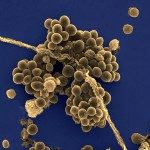Link to Pubmed [PMID] – 19064255
Cell Host Microbe 2008 Dec;4(6):543-54
Type I interferon (IFN) is an important host defense cytokine against intracellular pathogens, mainly viruses. In assessing IFN production in response to group B streptococcus (GBS), we find that IFN-beta was produced by macrophages upon stimulation with both heat-killed and live GBS. Exposure of macrophages to heat-killed GBS activated a Toll-like receptor (TLR)-dependent pathway, whereas live GBS activated a TLR/NOD/RIG-like receptor (RLR)-independent pathway. This latter pathway required bacterial phagocytosis, proteolytic bacterial degradation, and phagolysosomal membrane destruction by GBS pore-forming toxins, leading to the release of bacterial DNA into the cytosol. GBS DNA in the cytosol induced IFN-beta production via a pathway dependent on the activation of the serine-threonine kinase TBK1 and phosphorylation of the transcription factor IRF3. Thus, activation of IFN-alpha/-beta production during infection with GBS, commonly considered an extracellular pathogen, appears to result from the interaction of GBS DNA with a putative intracellular DNA sensor or receptor.

